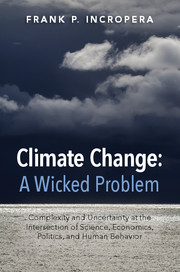 Climate Change: A Wicked Problem
Climate Change: A Wicked Problem Book contents
- Frontmatter
- Dedication
- Contents
- Foreword by Anthony F. Earley Jr.
- Foreword by G.P. “Bud” Peterson
- Foreword by Arun Majumdar
- Preface
- Acknowledgments
- Abbreviations
- 1 Energy, economics, and climate change
- 2 The Earth's climate system
- 3 Greenhouse gases
- 4 Global warming
- 5 Consequences of global warming
- 6 Mitigation, adaptation, and geoengineering
- 7 Public policy options
- 8 The politics of global warming: a history lesson and future prospects
- 9 Dissenting opinions: the great hoax
- 10 The ethics of climate change
- 11 A way forward
- Appendix A Units and conversion factors
- Appendix B Fossil fuels
- Appendix C Anthropogenic sources of natural gas and methane
- Appendix D Environmental time scales and inertia
- Appendix E Coal-fired power plants: operating conditions and costs of carbon capture and sequestration
- Notes
- References
- Index
- Plate section
7 - Public policy options
Published online by Cambridge University Press: 05 October 2015
- Frontmatter
- Dedication
- Contents
- Foreword by Anthony F. Earley Jr.
- Foreword by G.P. “Bud” Peterson
- Foreword by Arun Majumdar
- Preface
- Acknowledgments
- Abbreviations
- 1 Energy, economics, and climate change
- 2 The Earth's climate system
- 3 Greenhouse gases
- 4 Global warming
- 5 Consequences of global warming
- 6 Mitigation, adaptation, and geoengineering
- 7 Public policy options
- 8 The politics of global warming: a history lesson and future prospects
- 9 Dissenting opinions: the great hoax
- 10 The ethics of climate change
- 11 A way forward
- Appendix A Units and conversion factors
- Appendix B Fossil fuels
- Appendix C Anthropogenic sources of natural gas and methane
- Appendix D Environmental time scales and inertia
- Appendix E Coal-fired power plants: operating conditions and costs of carbon capture and sequestration
- Notes
- References
- Index
- Plate section
Summary
Public policy measures can do much to accelerate deployment of carbon mitigation measures, and there are basically three options. One approach is to put a price on emissions, which can be done through a cap-and-trade system or an outright tax. The approach is motivated by the following premise: if the goal is to put a large dent in GHG emissions, a price tag must be put on the emissions. A second approach is to mandate reductions through the regulatory process. Forms of government regulation could include corporate average fuel economy (CAFE) standards for automotive transportation, renewable portfolio standards (RPS) for power production, and efficiency standards for buildings and home appliances. The third approach is to provide financial incentives to ease the cost of mitigation. Incentives can be provided as outright grants, tax credits for producing carbon-free energy, or preferential treatment for sale of the energy.
In each of the three approaches, a critical issue, both politically and economically, is cost management. If costs are too high, economic growth is stifled; if they are too low, emission reductions and innovation are stifled.
Cap-and-trade
Lawmakers are generally averse to increasing taxes. Hence, if they believe that a price should be placed on carbon emissions, they're inclined to favor a cap-and-trade system, even though, like a tax, the cost of implementation is ultimately borne by the consumer. In principle, the system works as follows. Governments impose caps (limits) on GHG emissions from large central sources such as power plants, oil refineries, natural gas producers, and manufacturers of energy-intensive products such as concrete, steel, and glass. Initially, the caps are high to allow time for adjustment but are gradually reduced until atmospheric GHG concentrations drop to desired levels. Commensurate with a prescribed cap, permits (allowances) are granted and/or auctioned to the emitting entities, with one permit corresponding to a unit of annual emissions such as 1 t-CO2eq.
Whether auctioned or granted, permits are traded on a market, which can be regional, national, or international. Permits are sold by those able to economically reduce emissions below their cap and bought by those finding such purchases to be a more cost-effective approach to compliance.
Information
- Type
- Chapter
- Information
- Climate Change: A Wicked ProblemComplexity and Uncertainty at the Intersection of Science, Economics, Politics, and Human Behavior, pp. 148 - 160Publisher: Cambridge University PressPrint publication year: 2015